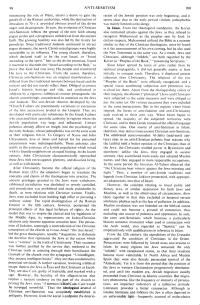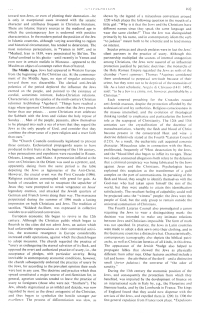[Abolition of Jewish privileges
and autonomy - rapid disintegration of the Roman Empire]
<[[...]]
After Christianity became the official religion of the Roman
state (321) the emperors began to translate the concepts and
claims of the theologians into practice.The ancient privileges
granted to the Jews were withdrawn, rabbinical jurisdiction
was abolished or severely curtailed, and proselytism was
prohibited and made punishable by death, as were relations
with Christian women. Finally, Jews were excluded from holding
high office or pursuing a military career. The rapid
disintegration of the Roman Empire in the fifth century,
however, postponed the principal effects of this legal
forfeiture of rights.
["Christian truth" against
the synagogue - Jewish murders in the Bible are negative
examples]
As the model that was to inspire the clerical and lay
legislators of the Middle Ages, its repercussions on
Judeo-Christian relations only become apparent centuries
later. The persistence of Judaism, seemingly a contradiction
of the Christian conception of the church as
Versus Israel, "the true
Israel", led the great theologians, notably *Augustine, to
elaborate the doctrine that represents the Jews as the nation
which was a "witness" to the truth of Christianity. Their
existence was further justified by the service they rendered
to the Christian truth in attesting through their humiliation
the triumph of the church over the synagogue. "Unintelligent,
they possess intelligent books"; they are thus condemned to
perpetual servitude.
A further variation, reversing a biblical image, depicts the
Jews as Esau and the Christians as Jacob. They are also Cain,
guilty of fratricide, and marked with a sign. However, the
hostility of this allegorization also implies a nascent
tendency on the part of the church to protect the Jews, since
"if someone killed Cain, Cain would be revenged sevenfold."
Thus the ideological arsenal of Christian anti-Semitism was
completely established in antiquity. However, from the social
standpoint the deterioration (col. 99)
of the Jewish position was only beginning, and it seems clear
that in the early period virulent judeophobia was mainly
limited to the clergy.
In Islam
[Jews don't accept Muhammad -
military spread of Islam - minority rights - Jewish and
"Christian" tax]
From the theological standpoint, the Koran also contained
attacks against the Jews, as they refused to recognize
Muhammad as the prophet sent by God. In certain respects,
Muhammad utilized the Bible in a manner similar to that of the
Christian theologians, since he found in it the announcement
of his own coming, but he also used the New Testament in the
same way.
As a result, Jews and Christians, although "infidels", are
both regarded by the Koran as "Peoples of the Book",
"possessing Scriptures".
Since Islam spread by force of arms rather than by spiritual
propaganda, it did not generally aspire, at least initially,
to conquer souls. Therefore, it displayed greater tolerance
than Christianity. The religions of the two "Peoples of the
Book" were officially recognized, and a special status
combining subjection and protection was evolved for them.
Apart from the distinguishing colors of their insignia, the
dhimmi ("protected") Jews
and Christians were subjected to the same measures and were
obliged to pay the same tax. On various occasions they were
included in the same persecutions. But in the regions where
Islam reigned, the forms of anti-Judaism and anti-Christianity
each evolved in their own way.
When Islam began to spread, the majority of the subjected
territories were Christian, and in them Greek remained the
official language for some time.
[Islam policy copying
"Christian" anti-Semitism - Byzantium "Christians"
assimilating to Islam and taking anti-Semitic customs into
Islam]
One source of anti-Semitism in Islam, therefore, may derive
from ancient Christian anti-Semitism. The celebrated
controversialist Al-Jahiz (mid-ninth century) cites in an
anti-Christian polemic four reasons why the faithful held a
better opinion of the Christian than of the Jews: the
Christians wielded power in Byzantium and elsewhere; unlike
the Jews, they engaged in secular sciences; they assimilated
more easily and adopted Muslim names, and they engaged in more
respectable occupations. In the same period the historian
Al-Tabari observed that "the Christians bear witness against
the Jews morning and night." Thus, a number of anti-Jewish
traditions and legends from Christian folklore penetrated,
with appropriate adaptations, into that of Islam.
[Similarities between Jewish
and Muslim laws]
However, the concepts relating to ritual purity and dietary
laws, of similar inspiration for both Jews and Muslims, as
well as the observance of circumcision, drew them together in
that they excluded or lessened certain inhibitory phobias such
as the fear of pollution. In addition, Muslim revelation was
not founded on the biblical canon and could not become a
ground of contention, thus excluding one source of polemics
and oppression. In sum, the term anti-Semitism, which becomes
a particularly blatant semantic misnomer [[wrong word]] when
used in connection with the Arab world, also regarded as
"Semitic" can be employed only with qualifications in
reference to Islam.> (col. 100)
[1100-1850: "Christians"
eliminated in Muslim countries - Jews loosing stand in
Muslim countries]
<From the 12th century, the expeditions of the Crusades
aggravated the condition of Christians in the Orient.
Persecutions were followed by forced mass conversions to
Islam. In many regions the Jews remained the only "infidels"
with exceptional status, so that their situation became more
vulnerable. In North Africa and Muslim Spain they were also
fiercely persecuted (period of the *Almohads). Yet it is from
this period that the position of the Jews in western
Christendom progressively deteriorated, and until the modern
era, Jewish migration usually proceeded from Christian to
Islamic countries.
But migratory phenomena, like the frequency or intensity of
persecutions, are imperfect indicators of a collective
attitude. Literature provides a better conspectus. although in
Islamic literature and folklore the Jew is often depicted in
an unfavorable light - frequently accused of malevolence (col.
100)
toward non-Jews, or even of plotting their damnation - he is
only in exceptional cases invested with the satanic character
and attributes frequent in Christian literature. There are
Islamic literary sources in the medieval age in which the
contemporary Jew is endowed with positive characteristics. In
the modern period the position of the Jew in Islamic
countries, although varying according to region and historical
circumstance, has tended to deteriorate. The most notorious
persecutions, in *Yemen in 1697, and in *Meshed, Iran in 1839,
were perpetrated by Shi'ites. The
Yahud confined to his ghetto - until
recently in Yemen and even now in certain
mellahs [[Jewish
quarter]] in Morocco - appeared to the Muslim an object of
contempt rather than of hatred.> (col. 101)
===
Sources
|

Encyclopaedia Judaica (1971): Anti-Semitism, vol. 3,
col. 99-100
|

Encyclopaedia Judaica (1971): Anti-Semitism, vol. 3,
col. 101-102
|





